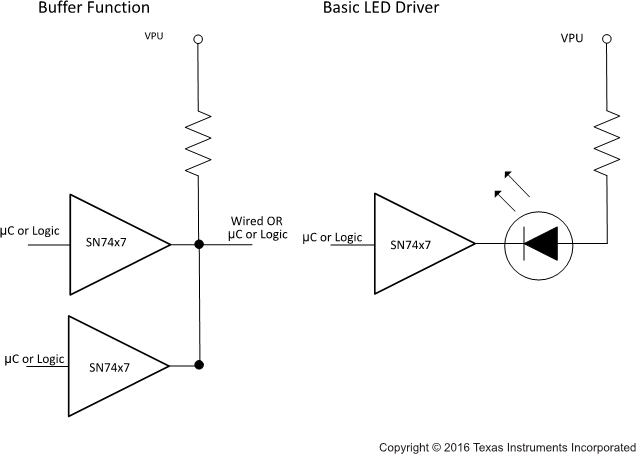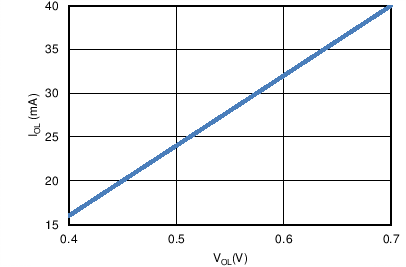SDLS032H December 1983 – September 2016 SN5407 , SN5417 , SN7407 , SN7417
PRODUCTION DATA.
- 1 Features
- 2 Applications
- 3 Description
- 4 Revision History
- 5 Pin Configuration and Functions
- 6 Specifications
- 7 Parameter Measurement Information
- 8 Detailed Description
- 9 Application and Implementation
- 10Power Supply Recommendations
- 11Layout
- 12Device and Documentation Support
- 13Mechanical, Packaging, and Orderable Information
Package Options
Refer to the PDF data sheet for device specific package drawings
Mechanical Data (Package|Pins)
- D|14
- N|14
Thermal pad, mechanical data (Package|Pins)
Orderable Information
9 Application and Implementation
NOTE
Information in the following applications sections is not part of the TI component specification, and TI does not warrant its accuracy or completeness. TI’s customers are responsible for determining suitability of components for their purposes. Customers should validate and test their design implementation to confirm system functionality.
9.1 Application Information
The SN74x7 device is a high-drive, open-collector device that is used for multiple buffer-type functions. The device produces 30 mA of drive current. Therefore, this device is ideal for driving multiple inputs and for high-speed applications up to 100 MHz. The outputs are high voltage tolerant up to 30 V for the SNx407.
9.2 Typical Application
 Figure 4. Typical Application Diagram
Figure 4. Typical Application Diagram
9.2.1 Design Requirements
Avoid bus contention because it can drive currents that would exceed maximum limits. The high drive also creates fast edges into light loads; therefore, routing and load conditions must be considered to prevent ringing.
9.2.2 Detailed Design Procedure
- Recommended Input Conditions
- Rise time and fall time specs: See tPHL and tPLH in Switching Characteristics.
- Specified high and low levels: See VIH and VIL in Recommended Operating Conditions.
- Recommend Output Conditions
- Load currents must not exceed 30 mA.
- Outputs must not be pulled above 30 V for the SNx407 device.
9.2.3 Application Curve
 Figure 5. VOL vs IOL
Figure 5. VOL vs IOL